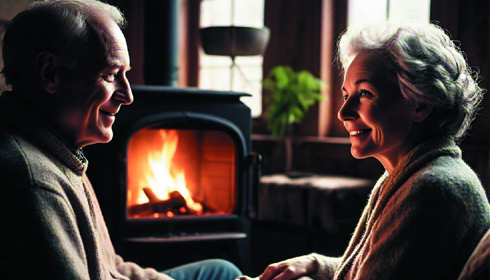
Colder Homes Linked to Cognitive Decline in Older Adults
A new study from the Hinda and Arthur Marcus Institute for Ageing Research, which is connected to Hebrew SeniorLife and Harvard Medical School, shows an important connection between indoor temperatures and how well older adults think and perform mentally. The results highlight the increasing danger that climate change brings brain health, especially for those who are most at risk.
The year-long study called “Home Ambient Temperature and Self-reported Attention in Community-Dwelling Older Adults” looked at how indoor temperatures affected attention problems in 47 adults aged 65 and older living in Boston, Massachusetts. Older adults found it easier to focus when the temperature at home stayed between 68 and 75 degrees Fahrenheit (20 to 24 degrees Celsius). But, when the temperature changed by 7 degrees F (4 degrees C) in either direction, the chances of losing focus doubled.
“Our research highlights how important it is to know how things like indoor temperature affect brain health as people get older,” said Amir Baniassadi, PhD, the lead author and assistant scientist at the Marcus Institute. “As the world gets warmer, it's essential to make sure people have places that stay cool to help keep their minds healthy.”
A big worry from the study is how it affects low-income and underserved seniors. Many of them might not have air conditioning or enough heating to stay comfortable. If people don't keep the right temperature, they might have a harder time thinking clearly as they get older. Dr. Baniassadi and his team highlight how important it is to take action for public health and create housing policies that can withstand climate challenges to protect this group of people.
The researchers pointed out, “Our results suggest that even with today's climate, many older adults face indoor temperatures that can harm their thinking skills.” “As climate change gets worse, this problem could become even bigger. It's vital to focus on policies that help older adults stay strong and safe in the face of these changes.”
The study highlights several strategies to address the challenges posed by fluctuating indoor temperatures, particularly for vulnerable populations like older adults. One effective solution is the use of smart home technologies, which can automatically adjust indoor temperatures to maintain comfort. These devices, such as programmable thermostats and smart sensors, can help create a cosy living environment by reducing the burden of manual adjustments.
Another critical approach is investing in energy-efficient housing. By upgrading homes with advanced insulation, energy-efficient windows, and modern climate control systems, residents can achieve better temperature regulation. These improvements not only enhance comfort but also significantly lower energy consumption, leading to long-term savings on utility bills.
Lastly, expanding access to cooling and heating resources can play a transformative role in supporting communities in need. Initiatives, such as establishing cooling centres during heat waves, providing affordable air conditioning units, and offering heating assistance during colder months can ensure that no one is left vulnerable to extreme indoor temperatures. Together, these strategies create a holistic framework for fostering healthier, more resilient living environments.
Dr. Lewis Lipsitz, who heads the Marcus Institute, emphasised how crucial it is to tackle this issue from all angles. “Better homes, smarter health plans, and advanced technology are essential for stopping climate-related thinking problems in older people,” he said.
The results add to earlier studies that connect room temperature with how well older people sleep and think. A study from 2023 by the same researchers showed that nighttime temperatures play a big role in how well older adults sleep, which can also impact their brain health.
This study reveals something interesting: even small changes in indoor temperature can affect how well people pay attention. This helps them to understand more about how their surroundings influence older people. It highlights that climate change impacts more than just physical health; it also brings new challenges for mental well-being.
Climate change is causing strange weather and hotter temperatures, making it vital to protect the brain health of older adults. This is a big issue that everyone needs to pay attention to. To keep older people safe and comfortable, there is a need to focus on a few important actions. First, policymakers should create housing policies that can withstand climate changes. Next, people must make sure everyone can access technologies that help regulate temperature. Lastly, promoting energy efficiency will play a big role in protecting our ageing populations.
This study urges policymakers, public health officials, and urban planners to build spaces where older adults can flourish, especially as global temperatures keep increasing.